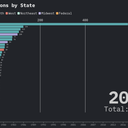
Saying “[a] movement was sworn in today,” long-time civil-rights lawyer Larry Krasner (pictured) — who pledged to end Philadelphia’s use of the death penalty — took the oath of office on January 2 as district attorney in a county that only five years ago had the third largest death row of any county in the country.
Krasner’s inaugural address put a face on the “[t]ransformational change in criminal justice” he had called for during the election, saying it was time to begin “trading jails — and death row — for schools,” “jail cells occupied by people suffering from addiction for treatment and harm reduction,” and “division between police and the communities they serve for unity and reconciliation.”
Krasner’s election has drawn national attention, as social-justice activists focus on new strategies to bring about social change. The Los Angeles Times placed Krasner among “a growing list of district attorneys around the country … who have declared that their role isn’t simply to prosecute, but to protect defendants from the excesses of the criminal justice system.” The American Prospect described “[t]he relatively quick swing from a death penalty devotee to a crusading reformer at the helm of a major American city’s DA office [as] both a distillation of a long-brewing shift in the politics of crime — away from the standard tough-on-crime bromides and toward a smarter approach to justice — and emblematic of a new recognition from progressives that electing allies into DA offices could be one of the most effective ways to reform the system from the inside.”
Since 2015, “reform” prosecutors have been elected to replace prosecutors in counties historically known for their aggressive use of the death penalty, including Harris (Houston), Texas; Duval (Jacksonville), Orange (Orlando), and Hillsborough (Tampa), Florida; Caddo Parish (Shreveport), Louisiana; and Jefferson (Birmingham), Alabama. But Clarise McCants, campaign director for the racial-justice organization, Color of Change, is eyeing upcoming district attorney races in 2018, saying “[t]he small number of [reform-minded] prosecutors we have elected so far is nothing compared to the kind of impact we could have.”
Krasner takes the reins of an office most recently headed by Ronald Castille, Lynne Abraham, and Seth Williams. Castille served as district attorney from 1986 – 1991, obtaining 45 death sentences and then participating in appeals in those cases after being elected to the Pennsylvania Supreme Court. Abraham was dubbed “America’s Deadliest DA,” obtaining 108 death sentences in her 19 years as district attorney between 1991 and 2009. She was replaced by Williams, who resigned after being convicted in 2017 of corruption charges.
Krasner’s election culminates two decades of dramatically declining death penalty use in Philadelphia. Death sentences, which averaged 9.9 per year in the 1990s, have fallen to an average of fewer than one per year this decade.
Justin Miller, The New Reformer DAs, The American Prospect, January 2, 2018; Malcolm Burnley, The Larry Krasner Experiment Starts Now, Philadelphia Magazine, January 2, 2018; Chris Palmer, Krasner becomes Philly DA: ‘A movement was sworn in today’, Philadelphia Inquirer, January 2, 2017; Nina Agrawal, Philadelphia’s new district attorney isn’t who you’d expect. Is his election a sign of more change to come?, Los Angeles Times, December 31, 2017.
See Public Opinion and Sentencing.



